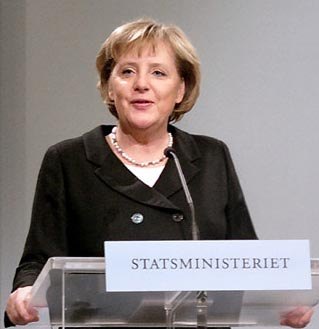European leaders to draw up crisis plan amid Eastern Europe shakeout
 Berlin - European leaders and finance ministers meet in Berlin Sunday to draw up an action plan to combat the world economic crisis and beef up market regulation amid the threat of a financial meltdown in Central and Eastern Europe.
Berlin - European leaders and finance ministers meet in Berlin Sunday to draw up an action plan to combat the world economic crisis and beef up market regulation amid the threat of a financial meltdown in Central and Eastern Europe.
Hosted by German Chancellor Angela Merkel, Sunday's meeting has been called to set out Europe's position on plotting financial market reform, and measures to tackle the recession ahead of the April summit in London of the Group of 20 (G20) major economic powers.
But this week's dramatic sell-off in markets across CEE states and warnings about the fragile state of the region's banking sector has meant Sunday's meeting of the seven key European Union (EU) nations will have to consider the more immediate problem of helping to shore up the CEE financial system.
This is likely to involve discussions at Sunday's meeting partly aimed at underpinning the co-ordination between key international institutions such as the International Monetary Fund and the European Bank for Reconstruction and Development.
But economists believe that crumbling economic growth, escalating unemployment, rising budget deficits and falling foreign investment could trigger further turmoil on CEE financial markets and result in another round of falls in currencies and shares.
The signs of renewed turmoil in CEE financial markets comes as Europe gears up to mark the fifth anniversary of the EU eastward expansion when took eight new member states, including Poland, the Czech Republic and Hungary. Bulgaria and Romania in January 2007.
Highlighting the buildup of tensions in the CEE, the government in Latvia resigned Friday as it battled to address country's sharp fall in economic growth, which plunged by
10.5 per cent in the fourth quarter last year.
Held in the chancellor's office, the weekend meeting is expected to repeat calls for overhauling the world financial system to ensure greater coordination between national supervisory authorities while boosting government efforts to spur economic growth.
In the face of the slowdown, Merkel is to press her colleagues from France, Britain, Spain, the Netherlands and Italy to draw up a new charter setting out the principles behind ensuring sustainable economic growth. G20 officials were given a deadline of March 31 to hammer out the details of the proposals agreed to in Washington.
This included steps to strengthen global financial accountability and disclosure measures as well as moves to monitor all major cross- border financial institutions, including the creation of new financial market watchdogs to be called college of supervisors.
But the Berlin summit is also expected to warn about the economic threat posed by protectionism as nations attempt to shield their economies from recession.
At the same time, the meeting in Berlin is also likely to renew the drive to reactivate the stalled world trade talks and to demand a concerted campaign against tax havens.
G20 finance ministers are also due to meeting next month in London to lay the ground for the April summit, which will be only the second time that the G20 leaders have met since the group was founded in 1999.
But while officials were putting the finishing touches on the agenda for the weekend meeting a reminder of the fragile state of global financial markets emerged again with shares around the world coming under pressure as the trading week came to a close.
After chalking up big falls earlier in the week, shares in Warsaw and the Czech Republic were down more than 3 per cent as the trading week ended. The Budapest stock market was down more than 6 per cent. Similar falls were recorded across western Europe.
The fresh outbreak of market tensions also came in the wake of new signs of the scale of the downturn gripping the global economy and the deepening crisis in the world banking business.
Indeed, another round of indicators published Friday pointed to the economic downturn gaining momentum across Europe with confidence in the 16-member eurozone manufacturing and services sector slumping. Business confidence in France plummeted to its lowest level in more than 40 years, a survey released Friday said.
Sunday's meeting also follows fresh evidence of turmoil that has taken hold in the global car sector with US giant automaker General Motors' Swedish offshoot SAAB applying for bankruptcy protection Friday.
Also attending the gathering in Merkel's Berlin office will be the Czech Republic leaders, which currently hold the EU's six-month rotating presidency, as well Luxembourg Prime Minister Jean-Claude Juncker who as president of the euro group representing the eurozone.
European Commission President Jose Manuel Barroso and European Central Bank chief Jean-Claude Trichet have also been invited to the Sunday meeting. (dpa)